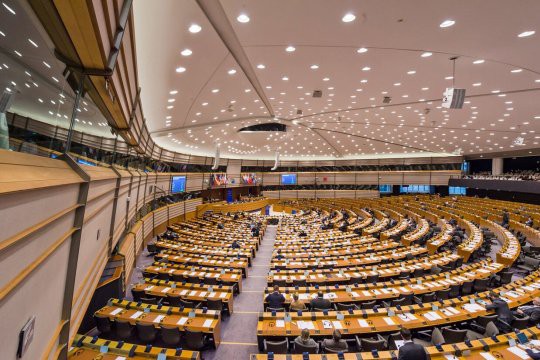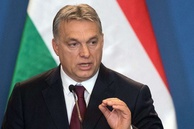The question of who will take up seats in the European Parliament (EP) in Strasbourg this year is increasingly being discussed by Western media and politicians. This time round, the upcoming June 6-9 elections to the EU’s influential political institution are often dubbed as “fateful” and all but sealing the entire future of the European Union. Preparations for the June vote are already in full swing with residents of the 27 EU countries going to elect 720 deputies for a five-year term. As predicted, the current struggle for representation in the European legislature is expected to be particularly tough, demanding the utmost mobilization of forces by all European parties.
Such expectations look pretty much valid because the stakes are high since the EP today has truly become a significant and competitive structure within the European Union - it has broad legislative powers, reviews the EU budget and actively speaks out on key issues of domestic and foreign policy. Essentially, in terms of political weight, it is almost equal to such institutions as the European Council, made up of heads of state and government, and the Council of the European Union (Council of Ministers). Which means that almost the entire course of the EU’s further development depends on who enters the parliamentary corps.
In an interview with the British newspaper The Guardian, the EU High Representative for Foreign Affairs and Security Policy, Josep Borrell emphasized the “fateful nature” of the forthcoming elections, voicing concerns about a possible qualitative change in the makeup of the European Parliament. The EU’s foreign policy chief and the current European political establishment are extremely concerned about the prospect of the upcoming elections considerably increasing the presence in Strasbourg of representatives of rightwing parties, including those Eurosceptics who dream of destroying the European Union - this time from the inside. According to Josep Borrell, European voters see the right as the force that will help end the uncertainty caused by the conflicts in Ukraine and the Middle East.
“I am afraid of fear; I am afraid Europeans vote because they are afraid. It’s scientifically proven that fear in the face of the unknown and uncertainty generates a hormone that calls for a security response,” Borrell noted. He emphasized that European parliamentary elections in June could be as fateful as the US presidential race, where Donald Trump could return to power. Mr. Borrell’s concerns were echoed the new French Foreign Minister, Stéphane Séjourné, who recently chaired the liberal group Renew Europe in the European Parliament. In an interview with Reuters, he said that “with far-right populists coming to power almost everywhere in Europe, we risk an ungovernable Europe.”
The forecasts made by these two politicians can be right or wrong, but one thing is clear: rightwing and far-right parties today continue their active political offensive across the European Union, quickly gaining points. The most striking example is the results of the November elections in the Netherlands, which, much to many people’s surprise, gave a landslide victory to Geert Wilders' anti-Islamic Freedom Party. The rise of the right is very evident also in Germany, Austria, Belgium, France, the Netherlands, Italy and Spain. Today, there is at least one rightwing party operating in each of the 27 EU countries, and the year 2024 is likely to bring them new successes. According to the recent polls, the Austrian Freedom Party, the most popular in the country, has good chances of winning the parliamentary elections in the fall. In Belgium, where parliamentary elections are due in June, the new rightwing party Flemish Interest is not only set to win in Flanders, the country's largest and richest region, but is also leading in general polls. Both it and its closest rival, the New Flemish Alliance, embrace local nationalism - even to the point of secession from Belgium.
“European populists are on the threshold of gaining real power,” the media conclude. If the things continue the way they do now, many in the realm of bigtime politics warn that “in 2027, none other than Marine Le Pen will be waving from the steps of the Elysee Palace.” Moreover, all this is happening at a time when many classical political parties that the EU elite have always relied on, are gradually losing ground or are in decline, just as they are in Germany.
The rightwing parties’ successes are generally attributed to their promises to voters to tighten their countries’ and the EU's approach to immigration and to soften the green climate agenda in order to support their domestic industries and preserve jobs. Well, this is true, but only partly so. In fact, the strengthening of rightwing parties reflects the growing public discontent in the EU countries with the overall economic and political situation, the rising cost of living, deepening social inequality and Brussels trying all too hard to impose its will on the members of the 27-nation bloc on many key issues. The degree of this dissatisfaction certainly went up with the aggravation of geopolitical risks for the EU countries, whose leadership eagerly joined the anti-Russian campaign. Public disagreement with Brussel’s anti-Russian policy has more than once spilled out onto the streets of dozens of European cities with mass demonstrations and protest rallies demanding a return to normalcy in relations with Moscow.
Analysts who evaluate data from the most authoritative and accurate media aggregators of information on mass-scale surveys and European elections, such as Europe Elects - Euractiv, as well as Politico poll of polls, are absolutely convinced that after June there will be a shift to the right in the European Parliament and in the EU as a whole. Their statistics may differ somewhat, but on the whole they see absolutely eye to eye on the main trends. According to forecasts, national-conservatives, Eurosceptics and the far right are all set to considerably strengthen their positions.
Nationalist party deputies of different countries, having united into like-minded pan-European EP factions, would surely change the balance of power in Strasbourg. But how radically? Right now, there are seven main factions represented in the European Parliament, bringing together MPs of dozens of nationalist parties, and just over 3 percent of deputies work outside of factions and groups.
Judging by the latest data from Europe Elects - Euractiv (as of the end of December 2023), the largest pan-European political force - the faction of the European People's Party (EPP unites mainly politicians of the Christian Democratic, Conservative and Liberal-Conservative persuasions) will generally be able to maintain its leading positions and get about 24 percent of the vote (179 seats). Most of these votes are expected to be provided by a third of EU countries: Bulgaria, Germany, Greece, Spain, Latvia, Poland, Slovenia, Croatia and Finland. This is essentially a center-right force that forms the stabilizing core of the EP and is sufficiently distanced from openly rightwing and far-right groups. This time again, the EEP, as the winner, will most likely nominate its candidate for the post of speaker.
At the same time, the far-right group Identity and Democracy (ID) and moderate Eurosceptics from the European Conservatives and Reformists faction can significantly increase their influence and count on third and fifth places, respectively. Thus, the ID can claim 12.5 percent of the votes and win 93 seats in the European Parliament (73 now), mainly due to voter support in Germany, France and the Netherlands. These are mainly those, who vote for the Alternative for Germany and Marine Le Pen’s National Rally in national elections.
European Conservatives and Reformists can count on 10.9 percent of the vote - largely due to the Brothers of Italy (Fratelli d'Italia) of Prime Minister Georgia Meloni. In terms of the number of seats, they will come fifth with 81 seats (62 now) behind the liberal group Renew Europe, which is expected to get 84 seats (108 now).
When speaking about the overall number of rightwing deputies, EU analysts tend to include in it representatives of the far-right French Reconquête party led by Éric Zemmour, as well as Hungary’s Fidesz party, who are not members of any factions or groups. Based on these statistics, it looks like the right will ultimately have 367 seats in the 720-seat European Parliament. However, as we know, statistics and reality are not always the same thing. Ideologically, these groups and factions are quite heterogeneous and are unlikely to act as a united front, but if successful, they will undoubtedly be able to seriously influence the current and future policies of Brussels. Suffice it to mention the painful issue of migrant flows, which is something the right-wingers generally look eye to eye on, differing only in the degree of radicalism.
The Socialists and Social Democrats (Progressive Alliance of Socialists and Democrats), will retain, although with some losses, their second place after the EPP (142 seats; 154 now). The European United Left – the EP’s smallest faction will suffer some losses too (36 seats; 41 now). However, the Greens – European Free Alliances will end up the main loser, projected to shed 25 seats. This reflects a general decline in public support for environmentalists in most EU countries due to their climate agenda being too strict and costly for the population.
Summing up all the predicted scenarios, it would be safe to assume that although a noticeable shift to the right in the European Parliament is sure to come, it won’t be radical and liberal media hysterics about the elections to the European Parliament to become “Europe’s darkest nightmare” is just a propaganda ploy. For the current EU elites, who have until now relied on the center-right EPP as the main force in the European Parliament, little will change. It will remain dominant and so far, there is no reason to believe that it would serve the core for alliances with the more radical right and ultra-right parties. Moreover, the EPP will most likely continue the practice of teaming up in a coalition with the center-left Progressive Alliance of Socialists and Democrats and the liberals of the Renewing Europe group.
While the European Parliament’s new makeup does not promise bright prospects for the current leadership of the European Union, it does not pull the plug on them either. We are talking primarily about the future of the European Commission’s President Ursula von der Leyen.
Her term in office will end in November, but her re-election in the new-look EP is by no means a done deal since her relations with rightwing parties have never been chummy. Moreover, the current head of the European Commission has not yet announced her decision to seek a second term. Previously, there have been rumors going around that she could become the new Secretary General of NATO, replacing Jens Stoltenberg. Well, this may be true, but chances of this still look slim. In view of the upcoming balance of forces in the European legislature, the wish by another top EU official, President of the European Council Charles Michel, whose mandate also expires in November, is quite understandable. The Belgian recently announced that he intends to retire early so that he can run simply as an MEP.
Of course, all current forecasts may change in the run-up to the June elections, especially when it comes to Germany, which has been allotted 96 parliamentary seats – the highest quota of representation in the European Parliament. The German faction is set to take in the largest number of rightwing deputies due to the very high ratings in national polls garnered by the Alternative for Germany (AfD) throughout 2023. Since the start of this year, further activities of this party inside Germany have been called into question though now that the AfD is going through a political scandal, which they may find it hard to sail out of.
The trouble stems from a secret meeting held last November at a villa in Potsdam between high-ranking Alternative functionaries and German and Austrian neo-Nazis to discuss possible plans for the deportation of migrants with German passports. In January, the Essen-based Center for Investigative Journalism Correctiv reported this on its website. Media publications capable of sending shock waves across the entire country do not happen every day, but this is exactly what happened this time. After all, about 17 percent of German citizens are migrants. Tens of thousands of people regularly take to the streets across the country protesting against the AfD and demanding that the party be banned. Against this background, some experts believe that the time of high ratings for Alternative is now over and its very future is becoming increasingly uncertain. The growing campaign to outlaw this rightwing party may result in very real lawsuits and decisions. The Federal Office for the Protection of the Constitution of Germany has repeatedly stated that it has gathered enough compromising materials against the AfD.
That being said, many in the German media believe that sidelining the AfD will not be easy. The procedure for banning a party in Germany is incredibly demanding and can take years. Only twice in the history of Germany did it actually end in a ban. Therefore, another option now being actively discussed to slow down the AfD’s activities is to apply Paragraph 18 of the German Constitution, which provides for the deprivation of active violators of constitutional norms of their basic civil rights, including electoral rights. This can only be done by the Constitutional Court. According to Paragraph 18, those who abuse basic democratic freedoms – of speech, press, assembly, etc. - “for the purpose of fighting against the free democratic order” are brought to justice. So far, this legal provision has been actively used against manifestations of Islamic fundamentalism. However, for the Constitutional Court to start considering the AfD case it needs a statement by the Bundestag, the government or the government of one of the federal states.
Will the leaders of Germany’s ruling “Traffic Light” coalition take this step?
read more in our Telegram-channel https://t.me/The_International_Affairs

 12:00 23.01.2024 •
12:00 23.01.2024 •



























